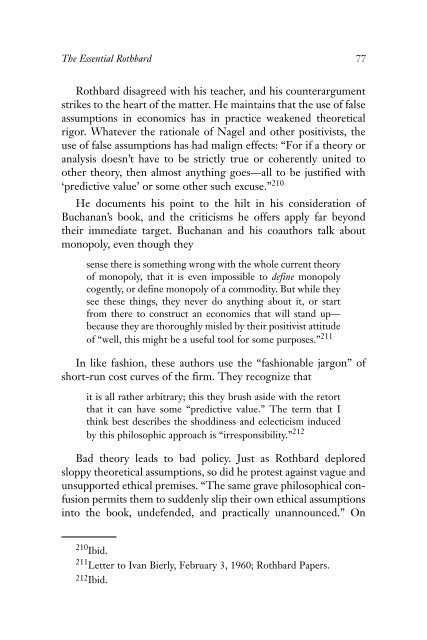The Essential Rothbard - Ludwig von Mises Institute
The Essential Rothbard - Ludwig von Mises Institute
The Essential Rothbard - Ludwig von Mises Institute
You also want an ePaper? Increase the reach of your titles
YUMPU automatically turns print PDFs into web optimized ePapers that Google loves.
<strong>The</strong> <strong>Essential</strong> <strong>Rothbard</strong> 77<br />
<strong>Rothbard</strong> disagreed with his teacher, and his counterargument<br />
strikes to the heart of the matter. He maintains that the use of false<br />
assumptions in economics has in practice weakened theoretical<br />
rigor. Whatever the rationale of Nagel and other positivists, the<br />
use of false assumptions has had malign effects: “For if a theory or<br />
analysis doesn’t have to be strictly true or coherently united to<br />
other theory, then almost anything goes—all to be justified with<br />
‘predictive value’ or some other such excuse.” 210<br />
He documents his point to the hilt in his consideration of<br />
Buchanan’s book, and the criticisms he offers apply far beyond<br />
their immediate target. Buchanan and his coauthors talk about<br />
monopoly, even though they<br />
sense there is something wrong with the whole current theory<br />
of monopoly, that it is even impossible to define monopoly<br />
cogently, or define monopoly of a commodity. But while they<br />
see these things, they never do anything about it, or start<br />
from there to construct an economics that will stand up—<br />
because they are thoroughly misled by their positivist attitude<br />
of “well, this might be a useful tool for some purposes.” 211<br />
In like fashion, these authors use the “fashionable jargon” of<br />
short-run cost curves of the firm. <strong>The</strong>y recognize that<br />
it is all rather arbitrary; this they brush aside with the retort<br />
that it can have some “predictive value.” <strong>The</strong> term that I<br />
think best describes the shoddiness and eclecticism induced<br />
by this philosophic approach is “irresponsibility.” 212<br />
Bad theory leads to bad policy. Just as <strong>Rothbard</strong> deplored<br />
sloppy theoretical assumptions, so did he protest against vague and<br />
unsupported ethical premises. “<strong>The</strong> same grave philosophical confusion<br />
permits them to suddenly slip their own ethical assumptions<br />
into the book, undefended, and practically unannounced.” On<br />
210 Ibid.<br />
211 Letter to Ivan Bierly, February 3, 1960; <strong>Rothbard</strong> Papers.<br />
212 Ibid.

















